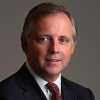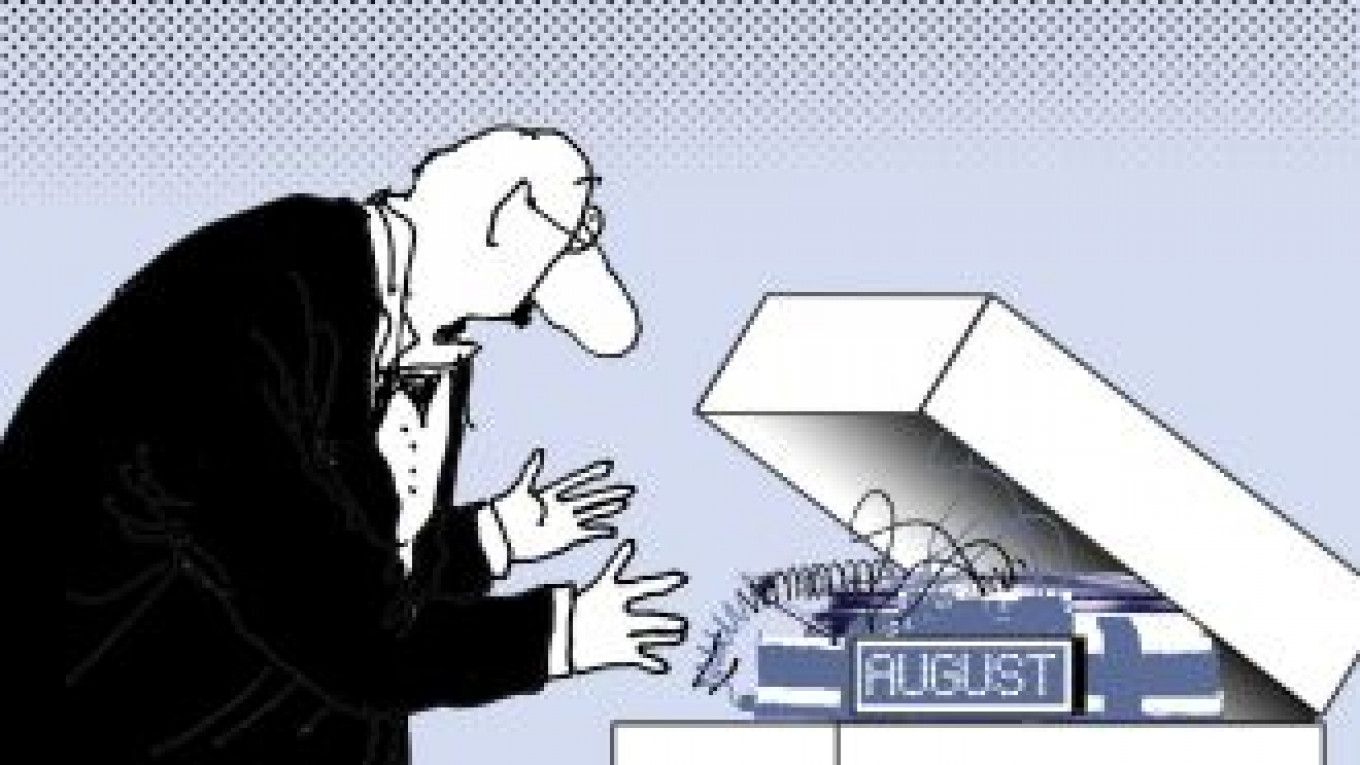August is vacation month in most parts of the world. It is a time when most people are more likely to be found on the beach or golf course than behind their desk. And while the proliferation of such devices as Blackberries and iPads has blurred the balance between rest and work, August is still the quietest month for most stock markets. Nothing much usually happens or is expected during the top vacation month.
This is true unless you are in Russia or are invested in Russia. August is actually the month investors are most fearful of. Over the past 15 years, August had a disproportionate number of events that either led to a sharp knee-jerk reaction on the stock market or proved to be major game-changers for how investors view Russia risk and opportunity over the following years. In seven of the past 15 years, the RTS equity index has recorded more than a 10 percent move between the start and end of the month. So as their peers in the U.S. and Europe head for the sun lounger, Russia investors are more likely to be those lying by the pool with a cold beer in one had and a hot Blackberry in the other as they worry about what might be this year's surprise or game-changing event.
Every August in Russia is interesting and scary in equal measure.
The list of such events since 1998 is quite impressive. Of course, Aug. 17, 1998, tops all Augusts. This is when the government finally gave up efforts to defend the currency and defaulted on some debt instruments. The equity market fell 56 percent that month as one foreign investor memorably described Russia as toxic nuclear waste and vowed never to return. He may have reassessed that stance the following year when the most significant game-changing event of the past 15 years took place: the emergence of Vladimir Putin as a major political player when he was appointed prime minister in August 1999. Boosted by about $1.5 trillion of oil and gas earnings over the next 8 1/2 years, Putin presided over one of the greatest stock market booms in history.
August 2000 will be remembered for the Kursk submarine tragedy and even though there was no markets implication it can certainly be argued that this was a game-changing event in many other ways. For example, Putin's reaction to such tragedies or to public criticism has been markedly different since then.
August 2001 was relatively quiet except for the month-long visit by North Korea's leader, Kim Jong II. His fear of flying meant chaos on Russia's rail network.
August 2003 produced one of those "sleeper" events that seemed innocuous at the time but that would prove to have very significant implications for investors over the following 10 years. It was the month when TNK-BP was officially formed.
August 2004 brought tragedy in the form of several acts of terrorism. The more serious event actually took place on Sept. 1 when Chechen terrorists seized a school in Beslan in North Ossetia. That led to major changes in how Russia dealt with Chechnya and terrorism. The following August was relatively quiet, although the first recorded case of bird flu in Russia, at the time viewed as a major threat to the global economy, did lead to a spate of near hysterical media coverage.
August 2007 is when two members of the State Duma led an expedition to plant a Russian flag on the Arctic seabed. It was clearly a PR stunt, but it served to spark the discussion over Arctic sovereignty. Russia is yet to formally submit its claim to the United Nations for extended sovereignty in the resource rich and strategically positioned Arctic but is expected to do so in the near term.
August 2008 was anything but quiet as Russia entered a five-day war with Georgia, which sparked heavy international criticism of Moscow and weakened financial markets. But it is impossible to gauge whether the war had a large investment-risk impact because global financial markets, along with the price of oil, were heading into a steep fall, and investors were running from all risk assets.
August 2009 was when an accident at one of the country's major hydropower plants killed 75 workers and kick-started a national debate over the state of the country's infrastructure. Weeks later, then-President Dmitry Medvedev initiated his modernization program, which centered on investment in infrastructure.
In August 2010, Moscow and much of the Moscow region was blanketed in smoke from fires in the surrounding bogs and forests, and the stock market hardly moved. This was accompanied by drought across the country, which led to a significant collapse in the country's annual food harvest. That sparked inflation in food prices and added to the base reasons for the economic sluggishness in which the country remains.
Finally, in August 2012, Russia ended 18 years of negotiations and was formally admitted to the World Trade Organization. The implications of that event will certainly be a game-changer — and a very positive one if the membership rules are adhered to.
What to expect in August 2013? Will it be one of those rare Augusts when we can relax, or are there some issues already visible that have the potential to cause a sharp market move or lead to longer-lasting changes in how investors view the balance between Russia risk and opportunity? We can break the topics down into three categories that former U.S. Defense Secretary Donald Rumsfeld once called the "known knowns,""known unknowns" and "unknown unknowns."
In the "known knowns" category are the preparations for the Group of 20 summit and Sept. 8 elections, including the Moscow mayoral race. The Kremlin had hoped to use the G20 as a platform to try, once again, to position Russia as an attractive investment opportunity. The timing couldn't be worse. Over the past weeks, headlines in newspapers all over the world have been dominated with such names as Sergei Magnitsky, Edward Snowden and Alexei Navalny. The Kremlin's PR gurus certainly have their work cut out for them.
The other item in the "known unknowns" category is the economy. The trend for macro growth indicators and inflation was poor through the first half year. But the consensus is these trends will turn much more positive in the second half. There is one encouraging sign, however: The inflation news is already much better since mid-June. Now businesses, investors and legislators are waiting with their fingers crossed that the growth indicators will also turn better. The data to be released in August and September will be key indicators. If the optimism is not vindicated, the pressure for increased stimulus will grow, hitting the ruble exchange rate and investment confidence.
As for the "unknown unknowns" category, that is what makes every August in Russia both interesting and scary in equal measure. What every investor actually does know is that if something out of the ordinary is going to happen in Russia, it is much more likely to happen in August than any other month.
Chris Weafer is senior partner with Macro-Advisory.com a consultancy advising macro hedge funds and foreign companies looking at investment opportunities in Russia.
A Message from The Moscow Times:
Dear readers,
We are facing unprecedented challenges. Russia's Prosecutor General's Office has designated The Moscow Times as an "undesirable" organization, criminalizing our work and putting our staff at risk of prosecution. This follows our earlier unjust labeling as a "foreign agent."
These actions are direct attempts to silence independent journalism in Russia. The authorities claim our work "discredits the decisions of the Russian leadership." We see things differently: we strive to provide accurate, unbiased reporting on Russia.
We, the journalists of The Moscow Times, refuse to be silenced. But to continue our work, we need your help.
Your support, no matter how small, makes a world of difference. If you can, please support us monthly starting from just $2. It's quick to set up, and every contribution makes a significant impact.
By supporting The Moscow Times, you're defending open, independent journalism in the face of repression. Thank you for standing with us.
Remind me later.








